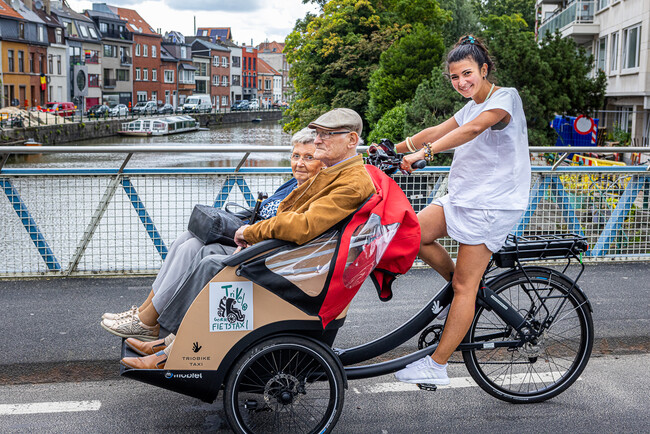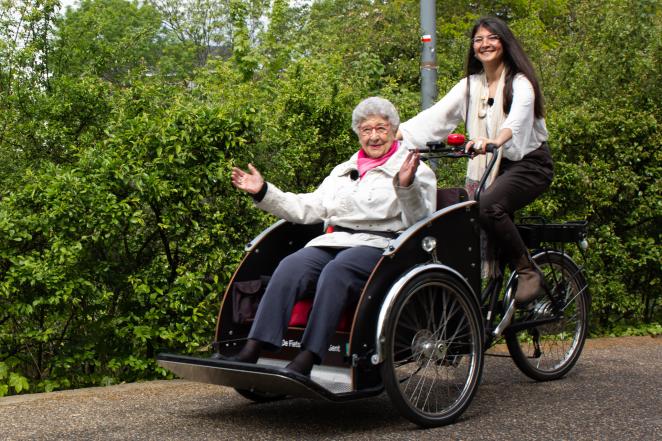Discover Ghent's Cycling Embassy, an external independent agency promoting sustainable transport and hosting the 2024 Vélo-city conference. In the SMALL project, they pilot the 'Fietstaxi service,' offering door-to-door rides for elderly individuals with reduced mobility through an engaged community of voluntary drivers, Join us for an in-depth discussion with founders Saar Fivez and Liesbet Colson.
The Cycling Embassy is an external independent agency of the City of Ghent that wants to stimulate and facilitate the use of the bicycle as a sustainable mode of transport in Ghent. In 2024, they will be the host for the famous Vélo-city conference that will take place in June. Within the SMALL project, the Cycling Embassy is piloting their ‘Fietstaxi service’ that serves voluntary based rides with rickshaws1 to people with reduced mobility in Ghent. More specifically, the service provides door to door rides for short trips for less mobile people who are not able to travel independently. This group mostly exists of elderly people. Despite being such a young service (founded in 2021), they managed to create a community of very involved and active voluntary drivers, mainly existing of newcomers and inhabitants of Ghent. We are happy to discuss this valuable service with its founders, Saar Fivez and Liesbet Colson.
But first, let’s look at some concrete numbers that the ‘Fietstaxi’ has achieved in 2023:
| Total number of rides | Total number of cyclists (= volunteers) | Average numbers of cyclist per month | Number of unique passengers |
|---|---|---|---|
| 5800 | 70 | 30 | 578 |
Esen: Hi, Liesbet and Saar. Thank you for joining us to shed light on the evolution and ambitions of the Fietstaxi service. Let's begin with the origin story. Can you share how the service came to be and the initial challenges you faced?
Liesbet: Certainly. Saar and I initiated the Fietstaxi service in 2020 as a citizen initiative, aiming to address the loneliness of the elderly and those with reduced mobility. However, the COVID-19 pandemic caused delays in our initial attempts to launch.
Saar: Yes, the breakthrough, however, came in 2021 when the city of Ghent extended support through funding. At that time, the Cycling Embassy of Ghent had three bikes (tricycles), which were barely used. We saw an opportunity here and proposed a plan to the City of Ghent. This way, we secured a small project funding in 2021 to initiate a pilot. After this successful trial, discussions followed with the City of Ghent and the mobility departments. Fast forward to May 2022, we officially became a service of the Cycling Embassy!
Esen: Your motivation to start the Fietstaxi service in 2018 was rooted in a desire to address societal issues, particularly the loneliness of the elderly people. What is it that makes your service so unique for the elderly people?

Liesbet: Saar and I wanted to contribute to a social project focused on reducing the isolation of elderly individuals. We also incorporated a commitment to working with refugees and newcomers, with around 30% of our volunteers being refugees.
Saar: Our service goes beyond traditional transportation. We focus on short distances, providing a door-to-door experience for those who may struggle with other means of transport. It's a personalized approach, offering assistance during activities such as shopping, making the Fietstaxi service a unique and socially impactful project.
Esen: So, that pilot transformed into an official service of the Cycling Embassy in Ghent in May 2022. The city of Ghent seems very proud of providing your service to their inhabitants. How has this collaboration influenced the growth of the Fietstaxi service over time?
Saar: Joining the Cycling Embassy was a turning point. We gained access to logistical support, locations, and various departments, including accountancy and communication. This support was instrumental in navigating challenges and propelling the project forward.
Liesbet: The collaboration with the city not only provided funding but also opened doors for a longer trial period. We are now embedded within the Cycling Embassy, which offers practical assistance such as bike repair facilities. This synergy has allowed us to evolve and expand.
Esen: It's a very nice win-win situation: your idea ensured that their rickshaws, which weren't used initially, were well used structurally. And then they can provide you with the structure to accelerate your idea towards the complete business and service.
Saar: Absolutely, it's a win-win situation. The city often faces a challenge in promoting sustainable mobility, particularly in the city centre, which is the case not only in Ghent but also in other urban areas. Travelling through the city centre can be challenging, especially for those with reduced mobility. The city of Ghent was already aware of this and was actively seeking solutions to address the issues people faced in reaching their destinations. Our initiative was well-timed, aligning with their ongoing research. We were welcomed as a valuable contribution toward resolving the transportation challenges faced by individuals with reduced mobility.
Esen: Ghent is very well-known as a progressive city when it comes to integrating shared mobility. In 2020, It even received the CSA Carsharing City Award, from Movmi and CSA, in the category ‘regional cities’. However, tricycles, and more specifically rickshaws, are quite new and unknown to the shared mobility world in Europe. Not a lot of people are aware of their existence. How would you define the role of the rickshaw service in the entire mobility ecosystem of the city?

Liesbet: Our service fills a niche for very short distances, serving people who may find it challenging to walk even 100-200 meters. This makes it a valuable alternative to traditional taxis, which can be expensive for such short trips. Additionally, our project goes beyond mere transportation; it's a social initiative. We spend time assisting passengers with tasks like shopping, where volunteers may even enter stores to guide and support them. This sets our project apart as a unique and low-barrier mobility solution.
Saar: Our focus is on providing a door-to-door service, a small but crucial part of the overall mobility ecosystem. We ensure individuals reach their destinations by picking them up from their residences and dropping them off at their intended locations. It's a process that improves accessibility for those who might struggle otherwise. The rides can also be first/last mile solution to connecting with public transport networks. In some cases, we take passengers to bus stops or train stations, enhancing their independence and integrating our service with broader transportation options.
Esen: So, it’s an added value, not only to the shared mobility ecosystem but also for complementing public transport, which we see as the backbone of our transport system. Now when you say shared mobility, you can’t unsee digitalization and concepts like Mobility as a Service. Exploring the digital landscape, what are the challenges and opportunities you foresee in integrating digitalization into the Fietstaxi service?
Saar: Approximately 80% of our users and volunteers are not familiar with digital apps. While we are considering different payment options, we recognize the importance of personal interaction. We aim to strike a balance between leveraging digital solutions and maintaining the service's strong social aspect.
Liesbet: Our users often prefer calling us for reservations, making a more personal connection. Digitalization might be a challenge due to the unique and personal nature of our service. We are exploring QR codes, but it remains to be seen how widely accepted and practical this will be.
Esen: Hopefully within the SMALL project you will get the room or the space to further experiment with your ambitions for the future. Back in January, when we organized our informal event for the first SMALL partner meeting in Ghent, we saw that you have a very strong community of volunteers. What strategies do you employ to build a strong community among your volunteers?
Liesbet: Appreciation is key. We take time to communicate with our volunteers regularly, ensuring they feel valued. Our approach includes organizing events and gatherings to foster a sense of community among volunteers who often ride alone.
Saar: Volunteers immediately see the impact of their work. They understand the importance of their role in the service and how it positively affects the community. This pride in their contributions strengthens our volunteer community.
Esen: You also already mentioned that you work with newcomers and refugees. Can you explain the added value of your service for them as volunteers?
Saar: Our initiative plays a unique role in helping newcomers integrate into the local culture. It's a layered experience—learning the language, navigating the city, and fostering connections with diverse individuals. Essentially, we create a bridge between generations and cultures. Picture this: newcomers riding around with various passengers engaging in conversations and discovering the city. The beauty is that these connections happen organically. We're not explicitly pushing people to connect, but it naturally unfolds. Even when there's a language barrier, everyone embraces it. We're thrilled about the idea of uniting people from different backgrounds on a bike ride. It's a meaningful initiative, and the positive outcomes are quite rewarding.
Esen: It's very beautiful. Mobility brings the people together, huh? You recently organised an engagement event aimed at gathering feedback from volunteers. Can you share more about the event and the lessons learned from the volunteers' perspectives? How did you reach out to the volunteers in the first place?

Liesbet: It starts with WhatsApp. Always with WhatsApp. We have a WhatsApp group to arrange the rides and we already see them a lot in between the rides, so this helps to reach out to them for such events. It's quite interesting, especially with our newcomer volunteers. Unlike the locals who actively engage in team chats, the newcomers tend to remain silent in these general conversations. We've discovered that a personal touch is crucial; reaching out to them individually makes a significant difference. While they enthusiastically operate the voluntary work and frequently join more intimate gatherings, we see that larger events, like quizzes, remain a challenge. Even casual meet-ups, like grabbing a drink, can be a tough sell. It's a puzzle we're working on—finding the right balance to involve them more in team activities.
Saar: The event focused on understanding what works well and areas that could be improved. Surprisingly, there were no major surprises. That’s really nice.
Liesbet: Yeah, the feedback we received emphasized the importance of maintaining the current level of engagement and addressing minor concerns. Volunteers expressed their satisfaction with the service and appreciated the platform to share their insights.
Esen: Looking ahead, what is your dream for the Fietstaxi service and how do you think the SMALL project can support you with that?
Liesbet: We hope to expand the bicycle taxi service even more and introduce it in other Flemish cities. The support of the other work package partners, let us think about a replication plan so we have time and support from other partners. Finally, we want to further professionalize the service by introducing a tool, reservation system. Thanks to SMALL, we have budget to explore this.
Esen: Saar, Liesbet, thank you so much for your time and most importantly for your amazing contributions to making shared mobility accessible for all. We will take note of these ambitions and support you as much as we can as the SMALL consortium.
